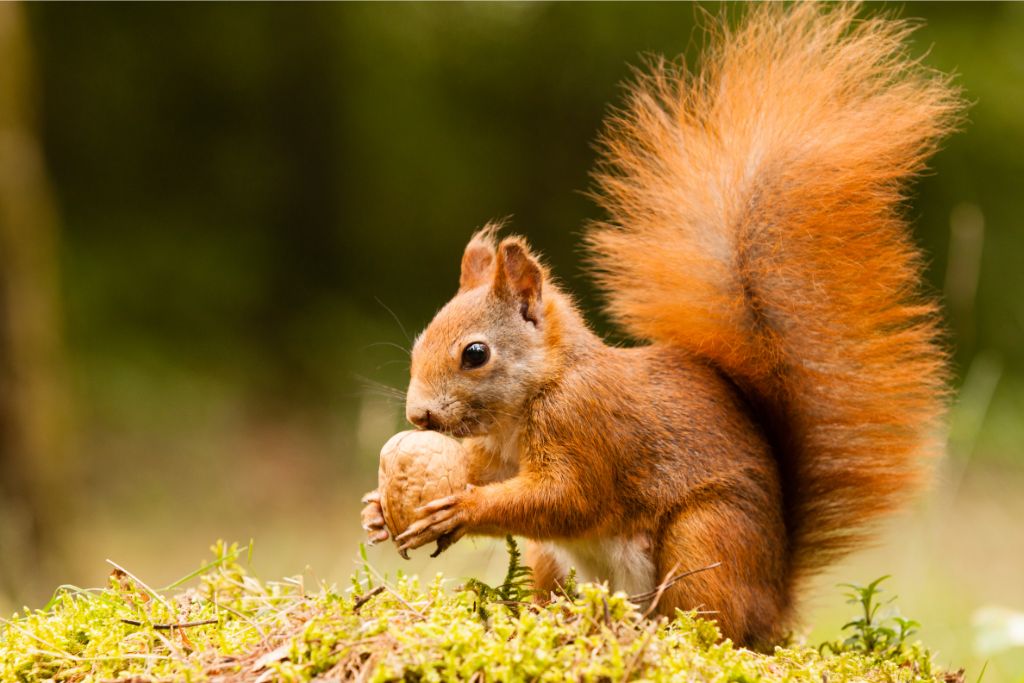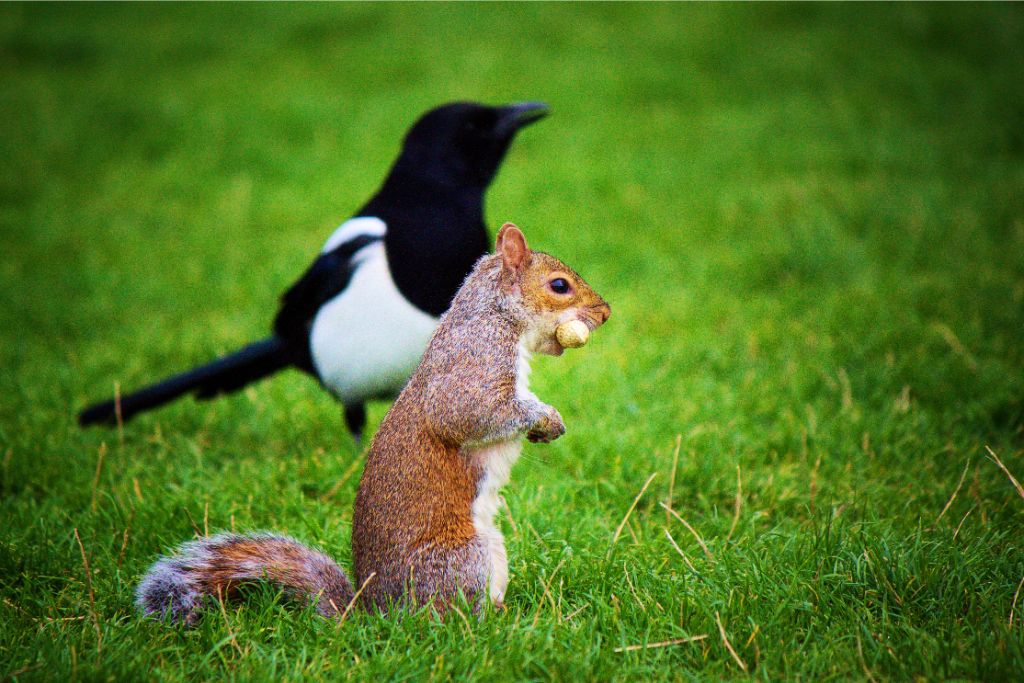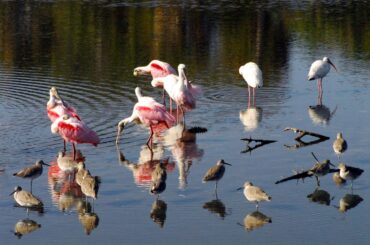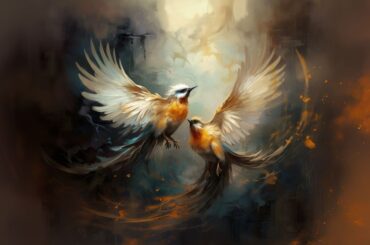Curious about the secret dining habits of squirrels? Ever wondered if these furry creatures might have a taste for birds? Understanding the eating habits of wildlife is essential for coexisting harmoniously with nature.
Squirrels, known for their acrobatic tricks and love for nuts, may surprise you with their dietary choices. By revealing this behavior, we learn about our ecosystem’s intricate connections.
This article explores whether squirrels eat birds by delving into their natural behaviors and food choices. Watch for intriguing and sometimes unexpected interactions between these small, fluffy-tailed creatures and birds.
The Squirrel’s Diet

In the delightful world of squirrels, their menu is a vibrant mix of nuts, seeds, and fruits. These bushy-tailed foragers have a particular fondness for acorns, walnuts, and hazelnuts, showcasing a diverse taste palate. Munching on these treats provides essential nutrients, keeping them active and flexible.
With their bustling activities, squirrels play a pivotal role as seed dispersers. As they collect and stash their favorite snacks, some seeds unintentionally get buried in the ground.
This accidental planting helps grow new plants and contributes to the overall balance of the ecosystem. When you see a squirrel moving around, think of it as a hardworking bird in nature’s big, green world.
Squirrels Feeding Habits
Birds have different ways of finding food. Many enjoy visiting feeders and birdhouses. Colorful cardinals and cheerful chickadees often come to places where people put out seeds, suet, and nectar. This lets birdwatchers have a great time watching them and helps the birds stay healthy.
Sometimes, people get confused when they see squirrels around these feeding areas. Squirrels are quick, active, and look like birds, especially when moving around. Some people even think squirrels can fly because of how they jump and climb.
These little foragers are good at climbing and use that skill to get to bird feeders. This can surprise people who mistake them for birds. The mix-up happens because birds and squirrels enjoy the food people put out for them.
Can Squirrels Eat Birds?

Yes! Squirrels can eat birds, but it’s not something they do every day. They resort to this when their usual food, like fruits and nuts, is scarce, especially in cold winters. Think of it as a backup plan for survival when their regular meals are hard to find.
It might sound surprising, but it shows how clever and adaptable these furry creatures can be in challenging situations. When there’s a shortage of snacks, squirrels might hunt small birds to get the protein they need to keep going.
Nature has its way of showcasing persistence and resourcefulness, even in the animal kingdom.
Scientific Studies and Evidence
Scientists have explored nature’s complicated animal interactions. One captivating area of study involves our furry friends, the squirrels, and their surprising dining habits. Researchers have carefully observed these creatures and found compelling evidence that squirrels do, indeed, snack on small birds.
Dr. Lily Greenfield, a devoted wildlife researcher, found that squirrels are agile, rapid climbers that can snag unwary birds. The researchers observed squirrels leaping from tree branches with accuracy and sneaking up on birds. Squirrels have a varied diet, challenging human beliefs and revealing animal interactions.
As we study animal secrets, we realize that even innocent animals have surprising behaviors. Through Dr. Lily Greenfield’s investigation, we see squirrels’ wild antics and their hunger for little birds. Nature always holds a few surprises, encouraging us to wonder at the delicate dance of life outdoors.
Opportunistic Behavior

Squirrels are like the clever tricksters of the forest, always looking for opportunities to get an easy meal. They take advantage of vulnerable animals by sneaking into bird nests.
Imagine a squirrel, with its bushy tail and nimble paws, climbing up trees like a little acrobat. These crafty creatures raid bird nests when the birds aren’t around. They might snatch eggs or even baby birds, using their quick movements to grab a tasty treat.
Picture a sunny day when birds are chirping and flying around. Squirrels, the social animals they are, sometimes join in on the birdie action. You might see a squirrel chasing a bird or playing tag in the branches. They’re not always sneaky thieves; sometimes, they want to have fun with birds.
As far as animals go, squirrels are opportunistic migrants. Life in the wild is full of surprises, and squirrels sure know how to make the most of every opportunity that comes their way!
Factors Influencing Squirrel Behavior
The squirrels we see in our neighborhoods are fascinating creatures, influenced by various factors. Their predation on birds shapes their behavior and can reveal their intricate lives.
Seasonal Shifts in Diet
As seasons change, so does the menu for squirrels. The availability of food plays a pivotal role in their behavior toward birds. During scarcity, squirrels might turn to birds as a protein-rich supplement, impacting their interaction dynamics.
Environmental Conditions
The surroundings significantly impact how squirrels behave around birds. Weather conditions and habitat changes can affect their foraging patterns, causing them to interact with birds differently.
Food Availability and Competition
Squirrels are opportunistic eaters, adapting to the food sources available in their surroundings. Competition for resources increases when nutrition is scarce, which may influence their behavior, including whether they eat birds.
Social Dynamics Among Squirrels
Nutrition shortages enhance competition for resources, which may affect their behavior, including bird eating. The presence of other squirrels and their collective behavior can impact how these creatures approach birds in their vicinity.
Nesting and Reproductive Periods
During breeding and reproductive seasons, squirrels may be more protective of their bird neighbors. This temporal aspect adds another layer to the intricate web of factors influencing their behavior.
Real Threats to Birds
Two significant challenges are turning birds’ happy songs into worried chirps. First, imagine a bird’s home filled with trees, bushes, and all the cozy nooks – this is their habitat. Sadly, many birds are losing these homes due to habitat loss. Without a home, birds struggle to find food and a safe place to raise their chicks.
Sometimes, the weather gets crazy – hotter summers and cold winters. Birds are feeling the heat, quite literally. Climate change messes up their surroundings, making finding food at the right time hard. They need our help to tackle these challenges because their homes and the weather are changing faster than they can adapt.
Some believe birds don’t need homes or can handle any weather, but they don’t. Understanding these real bird risks is crucial. Yes, birds have issues, but we can assist them in keeping their habitats and adjusting to the weather.
Let’s address the real challenges and be the heroes our feathered companions need instead of believing in useless myths!
Coexistence with Squirrels
Embrace the wonders of nature by welcoming furry friends into your backyard. Discover the joy of coexisting with squirrels while learning simple tips to make your space a thriving ecosystem.
Inviting Green Spaces
Transform your yard into a green paradise with vibrant plants and trees. Squirrels love to hop from branch to branch, and various vegetation provides them with a natural playground.
Nutty Treats
Sprinkle a handful of nuts in your garden, offering a delightful treat for squirrels. This simple gesture attracts them and promotes a healthy and balanced diet, ensuring their well-being.
Safe Hideouts
Install bird feeders and cozy nesting boxes in your backyard. These structures serve as safe spaces for squirrels to take shelter and build nests. Providing secure hideouts encourages them to stay and feel a sense of belonging.
Watering Holes
Set up small water stations with shallow bowls. Squirrels, like many creatures, need hydration. Offering water sources keeps them hydrated and makes them feel cared for.
Final Thoughts
In addition to nuts and seeds, squirrels sometimes eat birds. Seed dispersal by squirrels helps plants survive. Hence, their food preference helps the ecosystem. Let’s take a moment to appreciate the intricate dance of nature, where both squirrels and birds play unique and essential roles.
The nut-gathering skills of squirrels contribute to the expansion of various plant life. Meanwhile, with their aerial grace, birds contribute to insect control and pollination. As we observe these small but significant participants in nature, let’s understand the related web of life and each species’ environmental peace responsibility.
FAQs
Do Squirrels Eat Bird Eggs?
Yes, squirrels are known to eat bird eggs, and they may also consume baby birds if they find them vulnerable or accessible.
Will Squirrels Eat Baby Birds?
Squirrels are opportunistic feeders and have been observed preying on bird nests for eggs or young birds.





